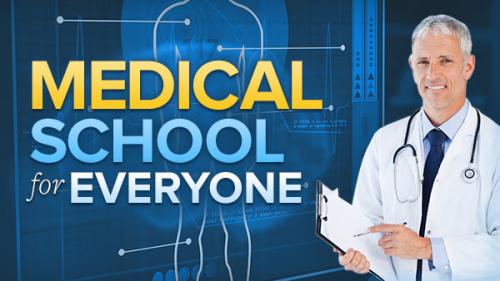TheGreatCoursesPlus - Medical School for Everyone: Grand Rounds Cases
Stretch your critical thinking muscles in this course that puts you in the shoes of a medical student on Grand Rounds, examining patients and diagnosing their conditions.
1: I Never Feel Good
- Start your rounds with a trip to a general clinic, where you meet a patient whose chief complaint is, "I never feel good." Along the way, you'll learn how doctors solve mysteries like this with the aid of several tools-the most important being the patient's medical history.
2: A Persistent Fever
- Go back to an outpatient clinic in 1981, where a young man's fever, cough, and ulcers led to a surprising diagnosis. This powerful lecture is an opportunity to learn more of the basic tools of medical diagnoses and to discover how doctors began to fight back against this modern epidemic.
3: Puzzling Pain
- Learn how critical a complete medical history, a thorough physical exam, and collaboration between doctors can be to make a tricky diagnosis. Your patient: "Louisa," a woman who has suffered from abdominal pain for years. Does she have irritable bowel syndrome? Is it all just psychological? Or is it something else entirely?
4: Just Look at Me
- This lecture's case involves an illness that's been around for millennia but which many of today's physicians have never seen. It involves a 10-year-old boy suffering from a rash that doesn't bother him, red-appearing eyes, and a cough. And the true culprit is one that could easily have been prevented.
5: Headaches in Wonderland
- Your patient is back in the emergency room with another "sinus headache," but the nurses think he's just after drugs. What's the real story? In finding out, you'll learn how physicians diagnose headaches; the differences between primary and secondary headaches; red flags doctors look for when determining their severity; and more.
6: The Tennis Player
- Discover how doctors diagnose a common disease that can kill a healthy 36-year-old woman in months but, in a 90-year-old, may not need to be treated at all. Through the case of a woman with increasing hip pain, you'll learn more about the genetics of this disease, ways to test for it, and more.
7: Sudden Collapse
- You're at the grocery and the person next to you suddenly collapses. What do you do? Here, learn how doctors (and laypeople) can use basic lifesaving steps to deal with a sudden catastrophe. Also, explore the methods physicians use to prevent health emergencies before they happen.
8: School Failure
- Meet a surly young man who could just be your typical teenager-or who could be suffering from an illness that's a severe threat to young adults. His story is a fascinating window into how doctors sort through myriad symptoms to diagnose and alleviate a highly prevalent-and all too serious-medical problem.
9: Dizzy Attacks
- Tina suffers from attacks of dizziness and is certain she has hypoglycemia, but doctors should never fall into the mental trap of starting a diagnosis with a false assumption. In this intriguing lecture, Dr. Benaroch shows you how physicians make expert diagnoses when one specific test isn't available.
10: Weight Loss
- Charlene has come into your office for a checkup and it is clear that she's lost a significant amount of weight. Follow along as Dr. Benaroch uses his medical savvy to make a diagnosis, reveal insights into what the real problem is, and establish a course of treatment that goes far beyond just taking pills.
11: I Can't Walk
- Discover how a young man's painful calves lead to a surprising diagnosis. As you'll learn, sometimes even the most uncommon of complaints can signify the presence of a fairly common illness. You'll also discover why you should never underestimate the seriousness of this particular diagnosis.
12: Learning from Failure
- Sometimes doctors make mistakes. As Dr. Benaroch guides you through the diagnosis of a patient with a case of recurrent hives, he reveals several powerful lessons for both doctors and patients. These include insisting on clear instructions and remembering that treating the disease is not the same as treating the patient.
13: The Children Who Come and Go
- Discover how a young man's painful calves lead to a surprising diagnosis. As you'll learn, sometimes even the most uncommon complaints can signify the presence of a fairly common illness. You'll also discover why you should never underestimate the seriousness of this particular diagnosis.
14: Guardian's Day
- How does a doctor get from the common complaint of constipation to a diagnosis of something much more dangerous? In solving this medical riddle, you'll learn about a particular medical epidemic so powerful and prevalent that, in one county in Kentucky, it's deprived many children of their parents.
15: Dickens's Diagnosis
- At 55 years of age and quite overweight, Joe falls asleep all the time. Is it narcolepsy? Is it kidney disease? The real culprit, you'll discover, is a condition originally described by author Charles Dickens; one whose effects are more wide-ranging (and life-threatening) on the human body than you can imagine.
16: Shaking Sammi
- Meet Sammi, an infant girl who's brought to the emergency room and suddenly starts shaking right on the examining table. How do doctors act to both help her and diagnose her as the attack happens? And what are the mysterious connections between the underlying diagnosis and a critical deficiency?
17: Hickam's Dictum
- Sometimes, a single patient can have more than one disease (a medical "philosophy" called Hickam's Dictum). This idea is illustrated by a middle-aged woman who can't stop vomiting. The road to determining her interconnected diagnoses is a harrowing story that illustrates why doctors always need to stay on their toes.
18: Forgetting Jerusalem
- Explore from two perspectives the case of a patient with a mysterious illness. First, see how doctors diagnose his condition and work with the patient to prevent a medical emergency so old it's mentioned in the Bible. Then, find out what happens in the worst-case scenario, where time is of the essence in saving a life.
19: Sherlock's Investigation
- Step inside a university's student health center, where your patient, Elena, makes repeated visits complaining of nausea, then vision troubles, then a urinary tract infection. What's going on here? Investigate how seasoned doctors act like Sherlock Holmes to arrive at a diagnosis of a disease that predominantly affects young adults.
20: The Boy Who Doesn't Speak
- This lecture's diagnosis is surrounded by controversy about what causes this specific illness, how it should be treated, and even how common it is. In exploring how doctors approach it, you'll learn insights into childhood development; specifically, how to know when something may be wrong and what tests can help narrow down a cause.
21: Antarctic Adventure
- You're on an expedition in Antarctica. You're diagnosed with a problem that requires immediate emergency surgery, and there's only one person who can perform it: you. Use this real-life scenario from the Soviet Union's Sixth Antarctic Expedition in 1961 as an intriguing window into how doctors diagnose and treat this problem in less extreme, 21st-century circumstances.
22: A Sunday Drive
- This Grand Rounds starts with you as an eyewitness to a serious motorbike accident, where the diagnosis is obvious and the story lies in what happens to the body when it's pushed to the edge of survival. Follow this patient from treatment at the site to lifesaving strategies in the emergency room.
23: Cough, Cough, Cough
- Margo, a 49-year-old woman, goes to the doctor with a persistent cough. What are the common (and not-so-common) causes of persistent coughing? How do trained doctors analyze cough for clues about an underlying diagnosis? And when this particular diagnosis is reached-how is it treated in an outpatient clinic?
24: A Confused Father
- Dr. Benaroch concludes this lecture series with an elderly patient who has frequent confusion and forgetfulness. Is the most obvious diagnosis the correct one? Then, he sums up the many lessons you've learned throughout the course, both about being a good doctor and a good patient.

Medical.School.for.Everyone.Grand.Rounds.Cases.part1.GC.rar
Medical.School.for.Everyone.Grand.Rounds.Cases.part2.GC.rar
Medical.School.for.Everyone.Grand.Rounds.Cases.part3.GC.rar

































